Introduction
Nature has bestowed upon us a myriad of remedies, often found in the simplest and most unassuming forms. Among these natural healers, the loquat tree (Eriobotrya japonica) stands out, particularly for its leaves, which have been traditionally used to alleviate respiratory ailments such as coughs. Fresh loquat leaves, when properly prepared, can offer a soothing and effective way to manage cough symptoms. This article delves into the intricacies of how to brew fresh loquat leaves for cough relief, exploring the science behind their efficacy, the preparation method, potential benefits, and important precautions to consider.
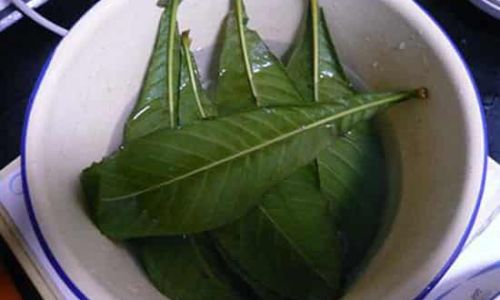
Understanding Loquat Leaves: A Brief Botanical Overview
The loquat tree, native to China, is a small evergreen tree or large shrub known for its edible fruit, the loquat (also called a Japanese plum or nesperry). However, it’s not just the fruit that holds medicinal value; the leaves have been utilized in traditional medicine for centuries. Loquat leaves are rich in various bioactive compounds, including triterpenoids, flavonoids, and polysaccharides, which contribute to their therapeutic properties.
These compounds are believed to possess anti-inflammatory, antioxidant, and expectorant activities. Anti-inflammatory properties help reduce inflammation in the respiratory tract, while antioxidants combat oxidative stress, protecting cells from damage. The expectorant action facilitates the clearance of mucus from the lungs, making it easier to breathe and reducing cough severity.
Historical and Modern Uses of Loquat Leaves
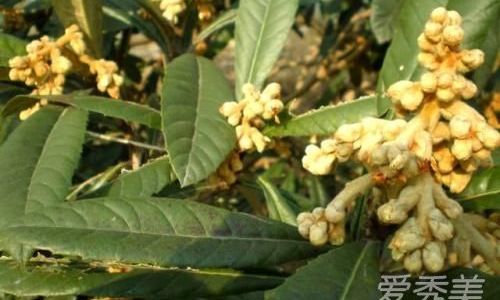
In traditional Chinese medicine (TCM), loquat leaves are considered to have a sweet and cool nature, making them suitable for treating heat-related conditions, including dry coughs and sore throats. They are often prescribed as a tea or decoction to soothe irritated throats and alleviate coughs associated with colds, flu, or bronchitis.
Modern research has begun to validate these traditional claims. Studies have shown that extracts from loquat leaves exhibit antibacterial and antiviral activities, potentially helping to combat infections that can exacerbate coughs. Furthermore, their ability to modulate the immune system and reduce mucus viscosity supports their use as a natural cough suppressant.
Preparing Fresh Loquat Leaves for Cough Relief: A Step-by-Step Guide
While dried loquat leaves are available in some herbal stores, fresh leaves are generally considered more potent and are easier to find if you have access to a loquat tree. Here’s how to prepare a simple and effective loquat leaf tea for cough relief:
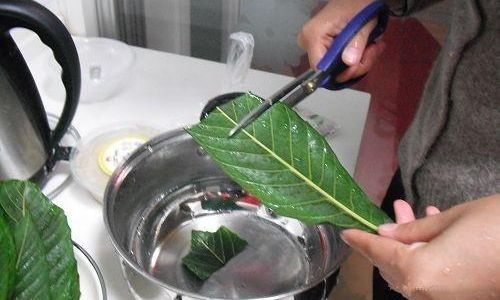
Harvesting the Leaves
- Timing is Key: Harvest loquat leaves in the spring or early summer when the tree is actively growing. Avoid leaves from stressed or diseased trees.
- Selection Criteria: Choose healthy, green leaves without signs of pests or disease. Younger leaves, which are more tender, may contain higher concentrations of active compounds.
- Cleaning: Rinse the leaves thoroughly under running water to remove dirt, dust, and any residual pesticides. Pat them dry with a clean cloth.
Preparation Method
-
Boiling Water Method:
- Boil Water: Fill a kettle or pot with fresh, clean water and bring it to a rolling boil.
- Add Leaves: Place the cleaned loquat leaves in a heatproof teapot or a saucepan. For every cup of water, use approximately 5-10 fresh leaves. Adjust the quantity based on the desired strength and personal preference.
- Simmering: Pour the boiling water over the leaves and let the mixture simmer gently for about 10-15 minutes. This allows the active compounds to infuse into the water.
- Straining: Remove the leaves from the water using a strainer. You can compost the used leaves.
- Serving: Pour the tea into cups and allow it to cool to a comfortable drinking temperature.
-
Infusion Method (Alternative):
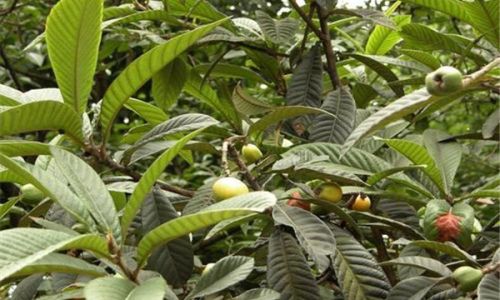
- Prepare Leaves: Place the cleaned loquat leaves in a tea infuser or a muslin bag.
- Pour Hot Water: Pour hot (not boiling) water over the leaves in a cup or teapot.
- Steeping: Allow the leaves to steep for 5-7 minutes. The longer the steeping time, the stronger the tea.
- Remove Leaves: Remove the infuser or bag and discard the leaves.
- Enjoy: Stir the tea if necessary and sip slowly.
Enhancing the Tea (Optional)
- Honey and Lemon: Add a teaspoon of honey and a slice of lemon to enhance the taste and boost the tea’s soothing properties. Honey is a natural cough suppressant and lemon provides vitamin C, which supports immune function.
- Ginger: A small piece of freshly sliced ginger can be added during simmering to increase the tea’s warming and anti-inflammatory effects.
Potential Benefits and Precautions
Benefits:
- Cough Relief: The expectorant and anti-inflammatory properties of loquat leaves can help clear mucus from the lungs and reduce cough severity.
- Soothing Throat: The tea provides a soothing effect on irritated throats, making it easier to swallow and reducing discomfort.
- Antioxidant Protection: The antioxidants in loquat leaves help combat oxidative stress, promoting overall respiratory health.
Precautions:
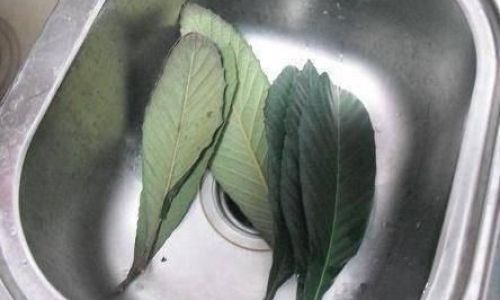
- Allergies: As with any herbal remedy, individuals with allergies to loquat or related plants should avoid using loquat leaf tea.
- Pregnancy and Lactation: Pregnant and lactating women should consult a healthcare provider before consuming loquat leaf tea, as its safety during these periods is not well-established.
- Medication Interactions: If you are taking medication, particularly for blood pressure or diabetes, consult your doctor before using loquat leaf tea, as it may interact with certain drugs.
- Dosage: While loquat leaf tea is generally safe in moderate amounts, excessive consumption may lead to stomach discomfort or diarrhea. Start with small doses and increase gradually as needed.
Conclusion
Fresh loquat leaves, when prepared correctly, offer a natural and gentle way to alleviate cough symptoms. Their anti-inflammatory, antioxidant, and expectorant properties make them a valuable addition to your home remedy arsenal. By following the steps outlined in this guide, you can harness the power of nature’s own cough suppressant, enjoying the soothing benefits of loquat leaf tea while promoting respiratory health. Remember, while herbal remedies can be beneficial, it’s always wise to consult a healthcare professional for severe or persistent coughs, as they may indicate a more serious underlying condition. Happy brewing!





0 comments